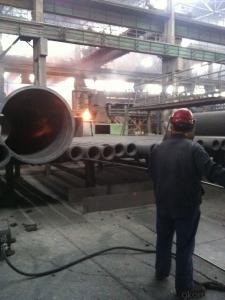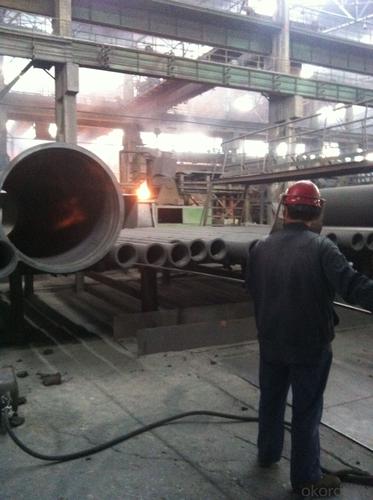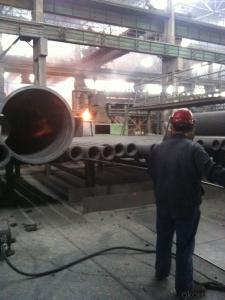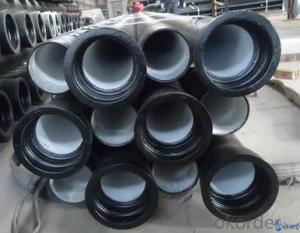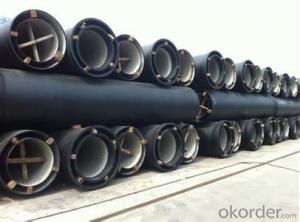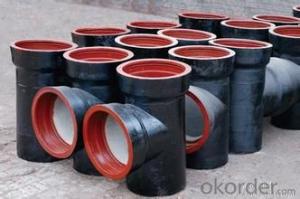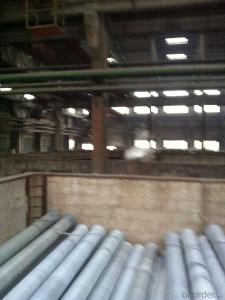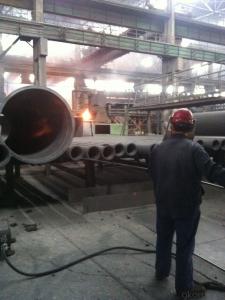DUCTILE IRON PIPES AND PIPE FITTINGS K9 CLASS DN1100
- Loading Port:
- Tianjin
- Payment Terms:
- TT OR LC
- Min Order Qty:
- 22 pc
- Supply Capability:
- 3000 pc/month
OKorder Service Pledge
OKorder Financial Service
You Might Also Like
Material : Ductile Cast Iron
Size Range : DN 80mm to DN 2000mm
Unit Effective Length : 6m or 5.7m
Manufacture Standard: ISO 2531:1998/ EN 545:2006/EN 598:2007
Annual capacity : 200,000 tons
Coating Exterior: Zinc 130g/m2 according to ISO 8179-1 and bitumen coating 70 microns.
Cement Interior: Portland Cement/ High Alumina Cement/ Sulphate Resisting Cement Lining according to ISO 4179
Special requirements on external coating and internal lining can be applied
We also provide accessories such as SBR/EPDM rubber gaskets, lubricant paste, pipe caps, PE sleeves, etc.
Additional Parts:
Each pipe is strictly inspected according to related standard to ensure permanently high performance.
Easy Installation at site and service free for life
Long Service Lifespan
Quotation will arrive you within 24hours once we get your inquiry.
We guarantee offering you a competitive price.
A copy of original inspection reports of pipes will be offered after shipment.
Photos of loading process will be sent to the customer after shipment effect.
We will follow-up the delivery progress after shipment effect and update to the customer on weekly basis.
- Q: How do ductile iron pipes perform in high-temperature water applications?
- Ductile iron pipes perform well in high-temperature water applications due to their inherent strength and durability. They can withstand the elevated temperatures without losing their structural integrity, making them an ideal choice for conveying hot water.
- Q: Can ductile iron pipe be used for water treatment plants?
- Yes, ductile iron pipe can be used for water treatment plants. Ductile iron pipe is a commonly used material in the water industry due to its strength, durability, and corrosion resistance. It is suitable for various applications, including transporting water in water treatment plants. Ductile iron pipe can withstand high pressure and is well-suited for underground installations. It also has excellent resistance to corrosion from water and chemicals commonly used in water treatment processes. Additionally, ductile iron pipe is easy to install and maintain, making it a preferred choice for water treatment plants. Overall, ductile iron pipe is a reliable and cost-effective option for water transport in water treatment plants.
- Q: How do ductile iron pipes handle soil movement?
- Ductile iron pipes have the ability to handle soil movement well due to their flexible nature. They can withstand stress and strain caused by ground settlement, thermal expansion, and contraction, without cracking or breaking. The high tensile strength and elasticity of ductile iron allow it to adapt to shifting soil conditions, making it a reliable choice for underground installations.
- Q: Can ductile iron pipes be used for trenchless installation methods?
- Yes, ductile iron pipes can be used for trenchless installation methods. Trenchless installation methods are techniques used to install underground pipes without the need for extensive digging or trenching. Ductile iron pipes are a strong and durable choice for these methods due to their high tensile strength and flexibility. They can be installed using various trenchless techniques such as horizontal directional drilling (HDD), pipe bursting, and slip lining. These methods allow for efficient and cost-effective installation of ductile iron pipes without disrupting the surrounding environment. Additionally, the corrosion resistance of ductile iron pipes makes them suitable for trenchless installations in various soil conditions and environments.
- Q: How does ductile iron pipe perform in areas with high soil erosion?
- Ductile iron pipe performs well in areas with high soil erosion due to its inherent strength and durability. Its thick walls and strong composition make it resistant to external pressures, including the erosive forces of soil. The pipe's ability to withstand the effects of soil erosion helps ensure its long-term performance and reliability in such challenging environments.
- Q: Can ductile iron pipes be used in areas with high levels of industrial effluents?
- Yes, ductile iron pipes can be used in areas with high levels of industrial effluents. Ductile iron is highly resistant to corrosion, making it suitable for handling various industrial waste streams and chemicals commonly found in effluents. Its durability and strength make it an ideal choice for such environments, ensuring long-term reliability and performance.
- Q: How does ductile iron pipe perform in high-velocity flow conditions?
- Ductile iron pipe performs exceptionally well in high-velocity flow conditions. Due to its unique properties, including high tensile strength and impact resistance, ductile iron pipe can withstand the forces exerted by high-velocity flows without experiencing significant damage or failure. One of the key advantages of ductile iron pipe is its ability to resist the effects of water hammer, which is a sudden increase in pressure caused by the rapid deceleration or change in direction of water flow. This is particularly important in high-velocity flow conditions where the velocity of water is significantly higher than normal. Ductile iron pipes are designed to absorb and dissipate the energy generated by water hammer, preventing potential damage to the pipe and the surrounding infrastructure. Additionally, ductile iron pipe has excellent flow characteristics, allowing for smooth and efficient water transport even at high velocities. This is crucial in applications where a large volume of water needs to be transported quickly, such as in industrial processes or fire protection systems. The smooth interior surface of ductile iron pipe minimizes friction and pressure losses, ensuring that the water can flow freely and efficiently, reducing energy consumption and operating costs. Moreover, ductile iron pipe is highly resistant to corrosion, which is a common issue in high-velocity flow conditions where the water may contain aggressive chemicals or particulates. The protective lining and coating systems used in ductile iron pipes provide a barrier against corrosion, extending the lifespan of the pipe and maintaining its structural integrity. In summary, ductile iron pipe is well-suited for high-velocity flow conditions due to its ability to withstand water hammer, its excellent flow characteristics, and its resistance to corrosion. Its strength, durability, and reliable performance make it a preferred choice for various applications, ensuring efficient water transport even in demanding environments.
- Q: What are the disadvantages of using ductile iron pipes?
- There are several disadvantages associated with using ductile iron pipes in various applications. Firstly, ductile iron pipes tend to be more expensive compared to other types of pipes, such as PVC or HDPE. This can be a significant drawback for projects with budget constraints. Secondly, ductile iron pipes are relatively heavy, which makes transportation and installation more labor-intensive and time-consuming. This can increase the overall cost of the project, especially when considering the need for specialized equipment and a skilled workforce. Another disadvantage is that ductile iron pipes are susceptible to corrosion. Over time, exposure to various environmental factors, such as soil conditions and water chemistry, can lead to the formation of rust and scale on the inner and outer surfaces of the pipe. This can reduce the pipe's lifespan and potentially affect water quality. Furthermore, ductile iron pipes can be prone to cracking or breaking under certain conditions, especially if exposed to heavy loads or significant ground movement. This can result in costly repairs or replacements, leading to additional expenses and disruptions to the water supply. Lastly, ductile iron pipes have a relatively low resistance to impact and abrasion compared to some other materials. This means they may be more prone to damage from external forces, such as construction activities or accidental impacts, which can further increase maintenance and repair costs. Overall, while ductile iron pipes have their advantages, such as high tensile strength and durability, it is important to consider these disadvantages before deciding on their use in a particular project.
- Q: What are the different sizes available for ductile iron pipe?
- Ductile iron pipes are available in a wide range of sizes to cater to various applications in the water and wastewater industry. The sizes of ductile iron pipes typically range from 3 inches to 64 inches in diameter. The most commonly used sizes include 4 inches, 6 inches, 8 inches, 10 inches, 12 inches, 16 inches, 20 inches, 24 inches, 30 inches, and 36 inches. However, ductile iron pipes can also be manufactured in larger sizes depending on specific project requirements. These different sizes allow for flexibility in designing and constructing water distribution systems, sewage networks, and other infrastructure projects. The selection of the appropriate size depends on factors such as the volume of flow, pressure requirements, and the distance the pipe needs to cover. It is worth mentioning that the size of a ductile iron pipe refers to its internal diameter, also known as the nominal bore. The actual outside diameter of the pipe may vary slightly depending on the manufacturer and the specific dimensions provided. When choosing a size for ductile iron pipes, it is essential to consider factors such as hydraulic capacity, installation requirements, and the compatibility with other pipeline components. Consulting with engineers and industry experts is advisable to ensure the correct size selection for each specific application.
- Q: Ductile iron and gray iron is what are the advantages and disadvantages of it
- Comparison of ductile iron and cast iron (gray iron)Compared with cast iron, ductile iron has an absolute advantage in strength. The tensile strength of ductile iron is 60K, while the tensile strength of cast iron is only 31k. The yield strength of ductile iron is 40K, while the cast iron does not show yield strength, and eventually breaks. The strength to cost ratio of ductile iron is far superior to that of cast iron. Ductile iron is the same as cast iron in corrosion resistance.
Send your message to us
DUCTILE IRON PIPES AND PIPE FITTINGS K9 CLASS DN1100
- Loading Port:
- Tianjin
- Payment Terms:
- TT OR LC
- Min Order Qty:
- 22 pc
- Supply Capability:
- 3000 pc/month
OKorder Service Pledge
OKorder Financial Service
Similar products
Hot products
Hot Searches
Related keywords
